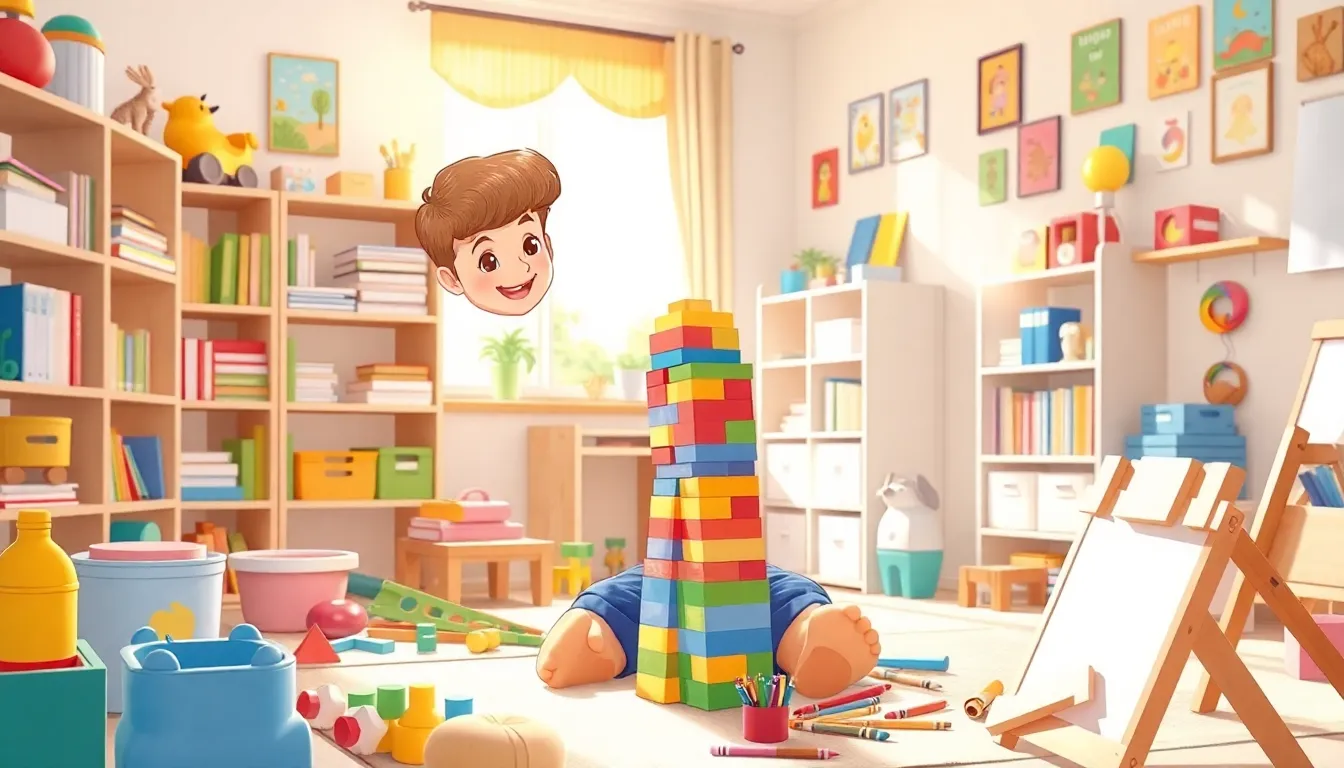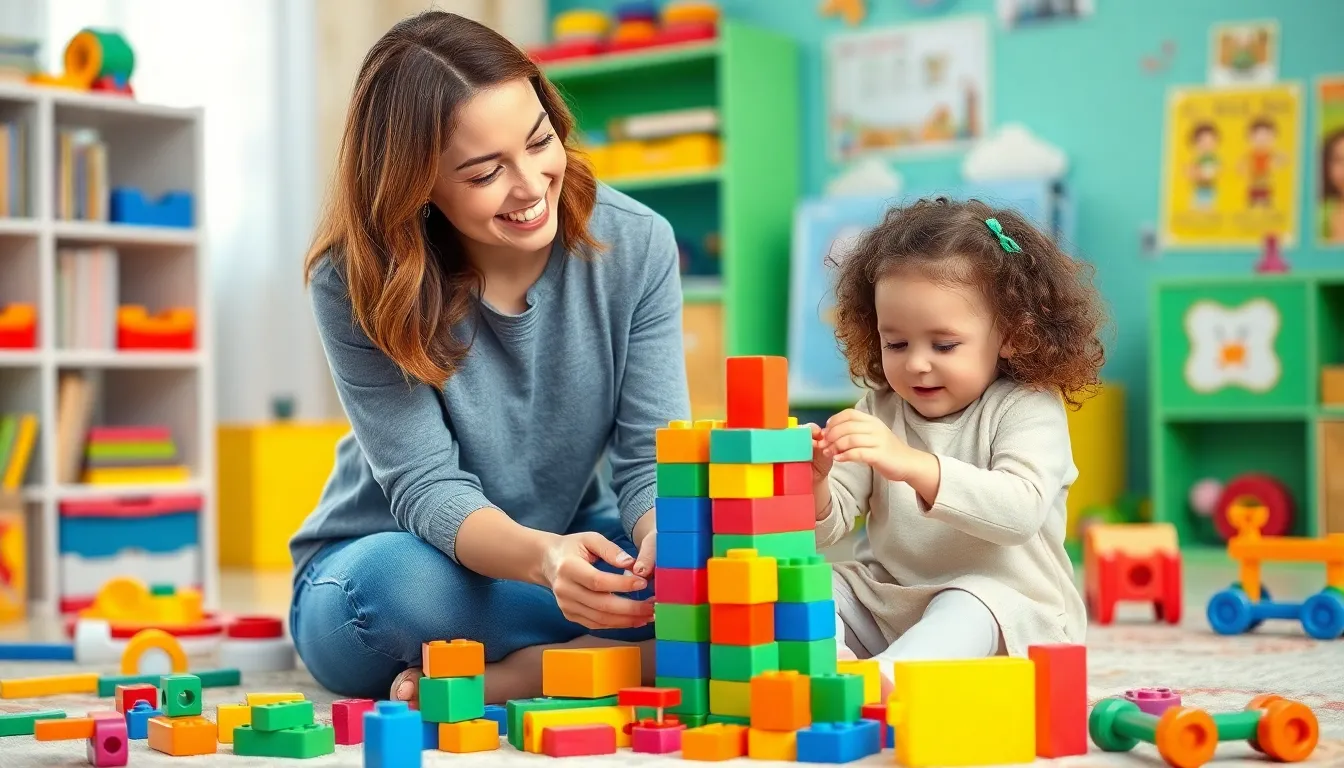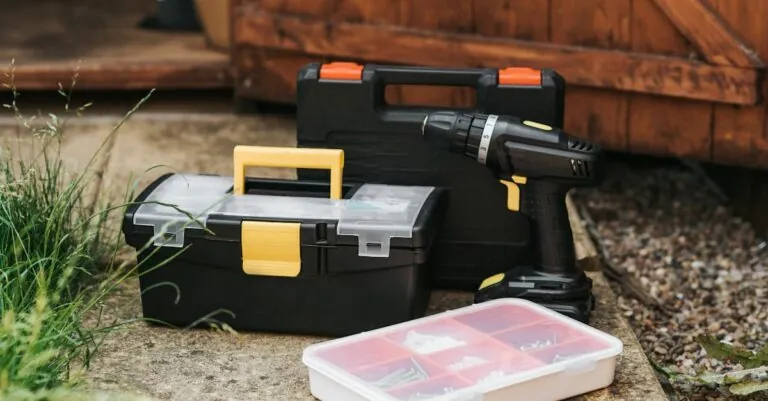In a world where toddlers can outsmart their parents with a simple game of peek-a-boo, early learning becomes essential. It’s not just about ABCs and 123s; it’s about sparking curiosity and nurturing a love for knowledge before they can even spell “knowledge.” With the right tips, parents can turn everyday moments into fun learning experiences that keep little minds engaged and giggling.
Imagine transforming snack time into a math lesson or bath time into an exciting science experiment. These early learning tips don’t just make education feel like a chore; they add a sprinkle of joy and a dash of creativity to every day. So buckle up and get ready to dive into a treasure trove of playful strategies that’ll have kids learning and laughing all at once. After all, who said learning can’t be a riot?
Table of Contents
ToggleImportance of Early Learning
Early learning plays a critical role in a child’s development. During the first few years, a child’s brain forms connections at an astonishing rate. These foundational years set the stage for lifelong learning, influencing cognitive, emotional, and social skills.
Research indicates that 90% of brain growth occurs before age five. This staggering statistic highlights the need for quality educational experiences during early childhood. Engaging toddlers in stimulating activities helps cultivate problem-solving abilities and critical thinking skills.
Incorporating educational elements into everyday routines makes learning more effective. For instance, conversations during snack time or bath time naturally enhance vocabulary and comprehension. Routine activities transform into rich learning experiences, fostering curiosity and creativity.
Parents play an essential part in early learning. Encouraging exploration and play reinforces a child’s confidence and independence. By providing a variety of learning opportunities, parents can help their children develop a positive attitude toward education.
Social skills also benefit from early learning. Interaction with peers promotes teamwork and empathy, essential components for future success. This head start in social development can lead to better performance in school and beyond.
Ensuring access to quality early learning programs provides numerous advantages. Children exposed to structured environments often display increased readiness for formal schooling. Parents should prioritize identifying suitable programs that offer diverse learning experiences aligned with their child’s interests.
Overall, early learning fosters a foundation for comprehensive growth. Success in later educational endeavors often stems from the impact of experiences gained in the early years.
Key Early Learning Tips

Early learning provides a critical foundation for lifelong success. Implementing effective strategies can significantly enhance a child’s educational journey.
Create a Stimulating Environment
A stimulating environment encourages curiosity and exploration. Parents can arrange colorful toys, engaging books, and interactive games, making spaces inviting for learning. Natural light and open areas also contribute to an enriching atmosphere. Outdoor experiences deliver fresh opportunities; trips to parks enhance sensory experiences, stimulating children’s minds. Regularly rotating toys keeps the environment dynamic and engaging. Spaces designed for creativity ignite imagination, turning everyday play into learning moments.
Encourage Exploration and Play
Exploration promotes learning through hands-on experiences. Children learn best when they engage with their surroundings. Offering varied materials—such as blocks and art supplies—invites children to discover and create. Observing children during play allows parents to identify interests, guiding future activities. Outdoors, activities like scavenger hunts provide excitement and learning opportunities. Groups foster social skills and peer interaction, essential for developing communication abilities. Flexibility in playtime lets children lead their experiences, encouraging autonomy and confidence.
Foster Language Development
Language development begins in infancy and progresses through constant interaction. Reading aloud to children enhances vocabulary and comprehension. Engaging in conversations, even with infants, builds verbal skills and connection. Singing songs or reciting rhymes makes learning enjoyable and memorable. Regularly introducing new words within everyday contexts enriches language exposure. Additionally, family discussions around daily activities promote comprehension and critical thinking. Using varied sentence structures allows children to hear language in rich contexts, promoting fluency and expression.
Activities to Enhance Learning
Incorporating fun activities boosts early learning and stimulates creativity in toddlers. Engaging toddlers in various activities nurtures their development and enthusiasm for knowledge.
Arts and Crafts
Arts and crafts activities foster creativity and fine motor skills. Toddlers can use simple materials like paper, glue, and crayons to express themselves. Creating art projects also enhances problem-solving abilities, as children decide what to create and how to do it. Including themes such as colors or shapes allows for educational discussions during play. Incorporating seasonal crafts or holiday projects helps children connect with their environment, making learning enjoyable and meaningful.
Reading Together
Reading together cultivates language development and strengthens comprehension skills. Parents can choose age-appropriate books to keep toddlers attentive and entertained. Discussing the pictures and storylines encourages conversation and boosts vocabulary. Establishing a regular reading routine, even just 10 minutes a day, fosters a love for books and storytelling. Moreover, interactive reading, where parents ask questions about the story, promotes critical thinking skills and deeper engagement with the material.
Engaging in Outdoor Activities
Outdoor activities provide vital opportunities for physical development and exploration. Children benefit from running, climbing, and playing in safe outdoor environments. Activities like nature walks or scavenger hunts teach kids about their surroundings while promoting curiosity. Encouraging group games fosters social skills and teamwork, essential for later success. Incorporating simple scientific exploration during outdoor play—like observing insects or identifying plants—brings learning to life and enhances a child’s understanding of the world.
Support from Parents and Educators
Parents and educators play a vital role in early learning. Their involvement significantly affects a child’s development and enthusiasm for learning.
Building Routines and Consistency
Establishing daily routines helps create a stable learning environment. Consistency in activities fosters a sense of security, encouraging children to explore and learn. Morning routines, such as reading together or engaging in fun educational activities, set a positive tone for the day. Incorporating structured times for play reinforces the learning process, enabling children to connect their experiences. Regular bedtime stories support language development and comprehension, forming an integral part of nightly routines. When caregivers consistently engage in these practices, children thrive in their learning journey.
Communicating Effectively
Effective communication is crucial for development. Engaging children in meaningful conversations stimulates language skills and critical thinking. Asking open-ended questions encourages them to express thoughts and feelings. Sharing experiences during daily activities reinforces vocabulary in context, making learning relevant. Using descriptive language while exploring new concepts enhances comprehension. Listening attentively to children validates their feelings, building confidence in communication. When parents and educators prioritize these interactions, they promote healthier, more fruitful relationships that benefit a child’s overall development.
Fostering early learning in toddlers is a rewarding journey that sets the stage for lifelong success. By transforming everyday moments into engaging learning opportunities parents can ignite curiosity and creativity in their children.
Creating a stimulating environment filled with interactive activities enhances cognitive development while encouraging exploration and social skills. The active involvement of parents and educators is vital in nurturing a child’s confidence and independence.
With consistent routines and meaningful interactions children thrive in a supportive learning atmosphere. Prioritizing early education not only enriches a child’s early years but also lays a solid foundation for future academic achievements. Embracing these early learning tips ensures that the joy of discovery becomes an integral part of a child’s life.




